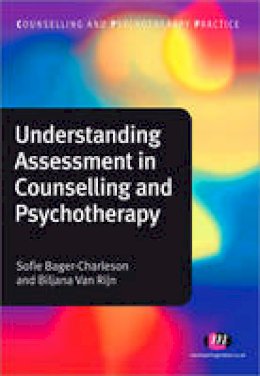
Stock image for illustration purposes only - book cover, edition or condition may vary.
Understanding Assessment in Counselling and Psychotherapy
Sofie Bager-Charleson
€ 42.52
FREE Delivery in Ireland
Description for Understanding Assessment in Counselling and Psychotherapy
Paperback. A concise guide to understanding assessments in counselling and psychotherapy. Series: Counselling and Psychotherapy Practice Series. Num Pages: 152 pages, Illustrations. BIC Classification: JKSN2; MMJT. Category: (U) Tertiary Education (US: College). Dimension: 246 x 334 x 10. Weight in Grams: 308.
This book offers students and trainees a thorough guide to clinical assessment. It covers different types of clinical assessment and explores the implications of the alternative views on clients' needs and treatment. It explores clinical assessment as an 'art and science' and brings the reader up to date with new requirements placed on therapists in both organisational and clinical practice based settings. In addition to outlining models for clinical assessment, it looks at the use of evidence-based practice in assessments. There are sections on doing assessments within organisations as well as from private practice.
This book offers students and trainees a thorough guide to clinical assessment. It covers different types of clinical assessment and explores the implications of the alternative views on clients' needs and treatment. It explores clinical assessment as an 'art and science' and brings the reader up to date with new requirements placed on therapists in both organisational and clinical practice based settings. In addition to outlining models for clinical assessment, it looks at the use of evidence-based practice in assessments. There are sections on doing assessments within organisations as well as from private practice.
Product Details
Publisher
SAGE Publications Ltd United Kingdom
Number of pages
152
Format
Paperback
Publication date
2011
Series
Counselling and Psychotherapy Practice Series
Condition
New
Weight
305g
Number of Pages
152
Place of Publication
Exeter, United Kingdom
ISBN
9780857254733
SKU
V9780857254733
Shipping Time
Usually ships in 4 to 8 working days
Ref
99-2
About Sofie Bager-Charleson
Sofie Bager-Charleson is a psychotherapist, supervisor and writer. She draws from psychoanalytic, existential and cognitive behavioural theory with a particular interest in postmodern influences on therapy. She holds a PhD from Lund University in Sweden, where she specialised in attachment issues within families and reflective practice amongst teachers. She writes both fiction and non-fiction. She works as an academic adviser for psychotherapists on the work based doctorate programme, DPsych with Metanoia/Middlesex University. She runs workshops and courses in therapeutic practice, reflective and creative writing, in both Sweden and England. Dr Biljana van Rijn is a qualified Transactional Analysis psychotherapist and a Teaching and Supervising Transactional Analyst in the field of psychotherapy. She has worked as psychotherapist and supervisor for a number of years in community organisations and private practice and tutored at Metanoia Institute. Biljana has been a head of clinical services at Metanoia Institute since 1998, and has gained substantial experience in psychotherapy assessment and formulation in this role. She has written on assessment previously and has established assessment training within the Metanoia Counselling and Psychotherapy Service.
Reviews for Understanding Assessment in Counselling and Psychotherapy
'The book is laid out well - it is accessible and easy to use, there is a synopsis of each chapter early on in the book and a summary at the end of each chapter, along with suggested further reading. There are activities and reflection points to prompt the reader to think about their role as an assessment counsellor, the hopes and expectations of assessments and the various necessary factors to be mindful of - the therapeutic alliance, the business side of the counselling frame, the client's motivation and psychological mindedness, achieving the balance between listening and containment and assessing risk. The book is relevant to therapists from various theoretical orientations - psychodynamic, humanistic, CBT and existential - which provides further fuel for thought. It is aimed at counsellors working in organisations and private practice. Towards the end of the book, generously, there is an assessment form, which readers may find useful' - Rafiya Hanid, Counsellor, University of West London; Head of Student Counselling
